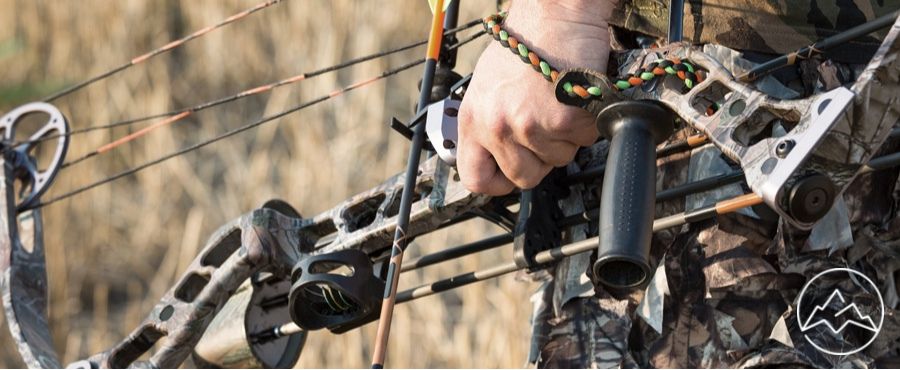Crossbows and compound bows are both effective hunting weapons and are used by sportsmen across the country. But which one is better overall? Let’s take a look at some key aspects to see which weapon comes out on top:
- Ease of use
- Optimal uses
- Price and popularity
- Regulations
Crossbow vs. compound bow: How easy are they to use?
These bow types differ quite a bit in terms of ease of use. Let’s take a look.
Crossbow
The biggest advantage that crossbows have historically had over regular compound bows is their overall ease of use. The reason that crossbows were developed in the first place is that anyone can pick one up and successfully use it for hunting as opposed to a compound bow.
Crossbows are relatively easy to be accurate with. You stabilize them with your shoulder and can use traditional iron sights or scopes for sighting. The only real effort to crossbow requires his initial exertion to load the arrow.
Compound bow
On the flip side, compound bows require plenty of practice before you see results. While they use a system of pulleys to help with drawing back the arrow, they still require some use beforehand to get a feel for sighting your arrow and learning how to properly hold the weapon.
Compound bows can eventually become just as easy to use as crossbows, but only after significant practice has been applied.
Optimal uses for compound bow vs. crossbow
Each bow type has specific uses that make one a better option than the other. Here’s when to use each one.
Crossbow
Crossbows are best used for beginners or those who do not have the time to put in to learn how to use a compound bow effectively. Crossbows are effective at killing targets at 70 yards or more, although their typical bolt size prevents them from being optimal weapon choices for bringing down larger animals.Crossbows are much better used for hunting small animals that move quickly.
Compound bow
Compound bows require a little more experience and practice to be effective, but are also fine for hitting targets at 70 yards or more. Compound bows are great for shooting at multiple different targets in quick succession since loading a new arrow is often faster with a compound bow than a crossbow.
Like with crossbows, many of the typical arrows used by compound bows may not be very effective for bringing down exceptionally large animals. Compound bows are best used for hunting smaller targets or slow-moving birds.
Both crossbows and compound bows are great for hunting animals that scatter quickly upon hearing a loud noise like a gunshot.
Price and popularity
Wondering how much each bow type could set you back?
Crossbow
Crossbows are fairly expensive when compared to cheaper options like recurve bows. However, they are more affordable than most compound bows and also have the advantage of being easy to use right out of the box.
You can expect to pay between $400 and $700 to get a good crossbow. Bolts for the crossbow will need to be purchased frequently as well.
Crossbows are falling behind when it comes to overall hunter popularity. This may be partially due to the public perception that crossbows are not as noble or skillful a weapon as a compound bow. In addition, crossbows have many intense restrictions depending on your home state.
Compound bow
Compound bows are often more expensive compared to crossbows. Some of the most advanced compound bow models can cost greater than $1000. While you can get a compound bow for less than this amount, you’ll want to spend the money on a decent weapon that can put in work. You’ll also need to purchase arrows if you are serious about hunting.
Compound bows are much more popular than crossbows. This is partially due to the fewer restrictions surrounding the use of compound bows when compared to crossbows. But it’s also because many people enjoy the aesthetic and skill required to effectively use a compound bow.There are many subcommunities of archery enthusiasts and bow hunters that have cropped up in recent years as a testament to the weapon’s growing popularity.
Headed on a hunting trip soon? Check out our top picks for the best hunting blinds.
Bow regulations
There are regulations that need to be followed when using either of these bows.
Crossbow
Crossbows are much more restricted than compound bows. Because crossbows are much easier to use than compound bows, many states view them as potentially more dangerous weapons and have increased regulations as a result.There are a few states that do not allow the use of crossbows at all. If you’re considering purchasing one, check to see if your state allows them in the first place.
Compound bow
Compound bow regulations typically revolve around how much let-off a given weapon has. Let-off is the force reduction necessary to hold the bow back after drawing. The regulation usually describes a minimum draw weight for the bow to ensure lethality when hunting.In addition, some states have regulations about what types of battery-powered devices can be combined with your bow. Keep this in mind if you want to fix the scope or red dot sight to your weapon.
FAQs About Crossbow vs. Compound Bows
What are the main differences between a crossbow and a compound bow?
Which type of bow is more accurate when it comes to shooting arrows?
How does the range of a crossbow compare to that of a compound bow?
Are there any special safety considerations when using a crossbow vs. a compound bow?
Does one type require more maintenance than the other, and if so, why?
Wrapping up
When it comes to this debate, there is no clear answer: only personal preferences. It will depend on what you’re looking to achieve and what your budget is. No matter the choice you make, always remember to exercise caution and play by the rules.
Best of luck!



